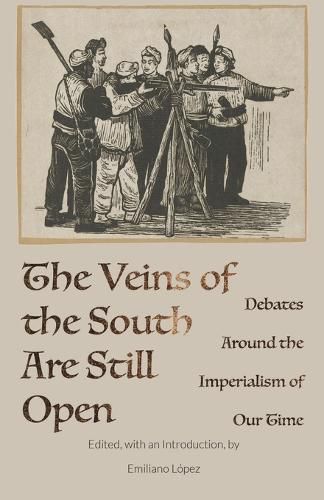Readings Newsletter
Become a Readings Member to make your shopping experience even easier.
Sign in or sign up for free!
You’re not far away from qualifying for FREE standard shipping within Australia
You’ve qualified for FREE standard shipping within Australia
The cart is loading…






This title is printed to order. This book may have been self-published. If so, we cannot guarantee the quality of the content. In the main most books will have gone through the editing process however some may not. We therefore suggest that you be aware of this before ordering this book. If in doubt check either the author or publisher’s details as we are unable to accept any returns unless they are faulty. Please contact us if you have any questions.
Inequality is not an abstraction or a mere theoretical speculation; it makes itself tangible in the bodies of the oppressed from the South. Imperialism is the most appropriate category to understand this global inequality. It is urgent to give substance, according to our current times and struggles, to this powerful concept in explicative and historical terms associated with the struggles of peoples for their liberation. Imperialism is both a concept and a native category of emancipation projects from the South. Understanding how imperialism acts today, through which mechanism it acts, defining the depth of its crisis and the possibilities of alternative hegemonies, allows us to re-edit our commitment to the liberation of our people in the Global South. It helps us realize that, to the greatest extent possible, we should close the wound that implies the spoliation of our bodies, our culture, our common goods and our jobs. The essays in this book argue against neoliberal globalization, against the ‘there’s no choice’ argument. They call into question the role that imperialist countries give to our Southern economies as the ones that guarantee cheap food; the new (old) forms of labour exploitation; the characteristics of competence between large-scale capitals; a new military strategy of the United States in the context of the crisis of its hegemonic project; and the nodal points to interpret the hegemonic succession we are living in as an opportunity and as a risk at the same time. Contributors: Prabhat Patnaik, Emiliano Lopez, John Smith, E. Ahmet Tonak, Atilio A. Boron, Gabriel E. Merino
$9.00 standard shipping within Australia
FREE standard shipping within Australia for orders over $100.00
Express & International shipping calculated at checkout
This title is printed to order. This book may have been self-published. If so, we cannot guarantee the quality of the content. In the main most books will have gone through the editing process however some may not. We therefore suggest that you be aware of this before ordering this book. If in doubt check either the author or publisher’s details as we are unable to accept any returns unless they are faulty. Please contact us if you have any questions.
Inequality is not an abstraction or a mere theoretical speculation; it makes itself tangible in the bodies of the oppressed from the South. Imperialism is the most appropriate category to understand this global inequality. It is urgent to give substance, according to our current times and struggles, to this powerful concept in explicative and historical terms associated with the struggles of peoples for their liberation. Imperialism is both a concept and a native category of emancipation projects from the South. Understanding how imperialism acts today, through which mechanism it acts, defining the depth of its crisis and the possibilities of alternative hegemonies, allows us to re-edit our commitment to the liberation of our people in the Global South. It helps us realize that, to the greatest extent possible, we should close the wound that implies the spoliation of our bodies, our culture, our common goods and our jobs. The essays in this book argue against neoliberal globalization, against the ‘there’s no choice’ argument. They call into question the role that imperialist countries give to our Southern economies as the ones that guarantee cheap food; the new (old) forms of labour exploitation; the characteristics of competence between large-scale capitals; a new military strategy of the United States in the context of the crisis of its hegemonic project; and the nodal points to interpret the hegemonic succession we are living in as an opportunity and as a risk at the same time. Contributors: Prabhat Patnaik, Emiliano Lopez, John Smith, E. Ahmet Tonak, Atilio A. Boron, Gabriel E. Merino